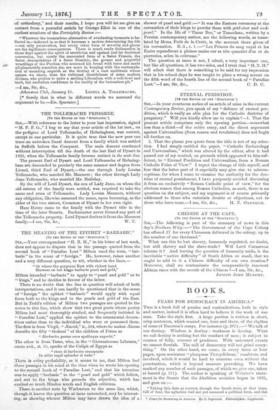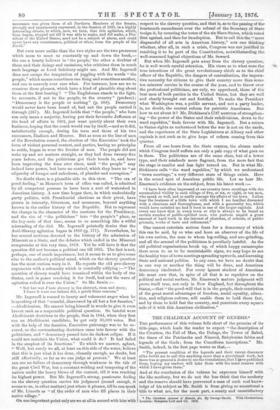BOOKS.
FEARS FOR DEMOCRACY IN AMERICA.* Tuts is a book full of puzzles and contradictions, both in style and matter, indeed it is often hard to believe it the work of one man. Take the style first. A large portion is written in short, crisp sentences, which remind one, here and there, of the rhythm of some of Emerson's essays. For instance (p. 287) :—" We talk of our destiny. Wisdom is destiny : weakness is destiny. What we call destiny is nothing but the conduct of men ; is subject to courses of folly, courses of prudence. With untoward events we cannot flourish. The mill of democracy will not grind every- thing." On the other hand, we come, in every three or four pages, upon sentences " plusquam Thucydidaian," cumbrous and involved, which it would be hard to construe even without the punctuation, which is beyond measure provoking. We have marked any number of such passages, of which we give one, taken at hazard (p. 171). The author is speaking of Webster's state- ment in the Senate that the Abolition societies began in 1835, and goes on :—
" Taking this date as correct, though the South wore, at that time, full of fear, the agitation had not yot assumed a political form, and the • 'cars for Dentocracy in America. By C. Ingersoll. Philadelphia; Lippincott. afentrance was given them of all Northern Members of the Senate, strongly and unanimously expressed, in the Session of 1835, in a highly interesting debate, to which, now, we turn, that this agitation, which, 'then begun stopped not till it was able to make, and did make, a Pre- sident of the United States, need not be a subject of alarm, and could never have any countenance, political or other, from the people of the North."
But even more unlike than'the two styles are the two presences
which seem to meet us constantly up and down the book,— the one a hearty believer in the people,' the other a doubter of them and their doings and omissions, who criticises them in much such language as Lord Salisbury might use. And Mr. Ingersoll does not escape the temptation of juggling with the words "the people," which means sometimes one thing and sometimes another, and one is scarcely ever sure what. For instance, how are we to construe these phrases, which have a kind of plausible ring about them at the first hearing? "The Englishman stands in the light, he accounts, if not to the people, to the country " (preface) ; "Democracy is the people or nothing" (p. 268). Democracy would never have been heard of, had not the people carried it through (267). Mr. Ingersoll holds that "the people," who here can only mean a majority, having put their favourite Jefferson at the head of affairs in 1801, just went quietly about their own business, hoping that the coach would run by itself,—and so it did, satisfactorily enough, during his term and those of his two successors, Madison and Monroe. But as soon as the line of men of the Revolution ceased, the election of 'the Executive' took the form of violent personal contest, and parties, having no principles to settle, began to wear the liveries of men. The people did not wake up and set matters straight, as they had done twenty-five years before, and the politicians got their hands in, and have been improving the time ever since, until "the people" may indeed have power, but have no control, which they leave to "an oligarchy of hunger and nakedness, of plunder and corruption."
• No doubt there is a plausible side to this view. "The era of good-feeling," as Monroe's term of office was called, is admitted by all competent persons to have been a sort of watershed in American history. A new time began then, in which undoubtedly party politics, with Presidential elections as their pivot, have grown in intensity, bitterness, and meanness, beyond anything known in the earlier history of the Republic. But to represent the change in the character of the contests for the Presidency, and the rise of "the politicians" into "the people's" place, as the key-note of that time, seems to us something like a wilful misreading of the dial. Mr. Ingersoll pointedly denies that the Anti-Slavery agitation began in 1819 (g. 171). Nevertheless, he has several sections.devoted to the history of the admission of Missourias a State, and the debates which ended in the Missouri compromise at this very time, 1819. Yet he will have it that the question did not become a political one till 1835. The fact isnot, perhaps, one of much importance, but it seems to us to give some clue to the author's political mind, which on the slavery question
has the most curious warp in it. He repeats the old pro-slavery arguments with a solemnity which is comically edifying :—" The question of slavery would have remained within the body of the
States, each in peace resolving it for itself, had not the wave of agitation rolled it over the Union." So Mr. Sawin :—
" Not but wut I hate slavery in the abstract, stem and stern; I leave it ware our fathers did, a privit State concern."
Mr. Ingersoll is roused to hearty and vehement anger when he is speaking of that "scandal, disavowed by all but a few fanatics,"
—Abolitionism. He cannot bring himself in words to give it even brevet rank as a respectable political question. So hateful were Abolitionist doctrines to the people, that in 1844, when they first ran an Abolitionist candidate, he got only 36,000 votes. But with the help of the fanatics, Executive patronage was to be se- cured, so the contaminating doctrines came into favour with the politicians, and "democracy passed into its darkest eclipse. If it could not maintain the Union, what could it do ? It had failed in the simplest of its functions." To which we answer, aghast, "Well, but surely we all, at least on this side of the water, believe that this is just what it has done, clumsily enough, no doubt, but still effectually, so far as we can judge at present." We at least can see no failure of democracy through weakness in the tale of the great Civil War, but a constant welding and tempering of the nation under the heavy blows of the contest, till it was reaching its highest power. But Mr. Ingersoll's strong, passionate feeling on the slavery question carries his judgment (sound enough, it seems to us, in other matters) just where it pleases, till he can speak
of Mr. Lincoln as "of the order of men who fill places in their native village."
On one important point onlyare we at all in accord with him with
respect to the slavery question, and that is, as to the passing of the fourteenth amendment over the refusal of the Secretary of State tosign it, by counting the votes of the six Slave States, which voted first against, and then for its adoption. But to call this the "most disgraceful of all acts in American history," sets one thinking- whether, after all, in such a crisis, Congress was not justified in resolving it to be part of the Constitution, notwithstanding the: well-reasoned logical objections of Mr. Seward.
But when Mr. Ingersoll gets away from the slavery question, he is well worth careful attention. His views as to what were the * true intentions of the great revolutionary chiefs as to the chief officer of the Republic, the dangers of centralisation, the impera- tive necessity for citizens to give their country more than some ten minutes' service in the course of the year, and to throw over the professional politicians, are only, we apprehend, those of the beat men of both parties in the United States, but they are well and clearly brought out and fortified. To make the President what Washington was, a public servant, and not a party leader; is, no doubt, the central reform for patriotic Americans. But how to set about it? Mr. Dickinson's 1787 nostrum of strengthen- ing "the power of the States and their subdivisions, down to the ward republics," finds favour with Mr. Ingersoll. But a return to States-rights as understood before the war is not on the cards, and the experience of the State Legislatures at Albany and other capitals is not such as to give hope of reform coming from this quarter.
From all one hears from the State centres, the abuses under which Congress itself suffers are only a pale copy of what goes on in them. The politicians are of the same class, but of a lower type, and their misdeeds more flagrant, from the mere fact that the stage is smaller and leas light turned on. But in what Mr.
Dickinson calls "the ward republics," by which we understand "town meetings," a very different state of things exists. Here is the sound spot of American public life. Let us hear Mr.
Emerson's evidence on the subject, from his latest work :—
a I have been often impressed at our country town meetings with tho accumulated virility in each village of five, or six, or eight, or ten men, who speak so well, and so easily manage the affairs of the town. I often hear the business of a little town with which I am familiar discusged with a clearness and thoroughness, and with a generosity too, which would have satisfied me had it been in one of the larger capitals. And every one know that in every town or city is always to be found as certain number of public-spirited men, who perform unpaid a great amount of hard work in the interest of churches, of schools, of public grounds, works of taste and refinement."
One cannot entertain serious fears for a democracy of which this can be said, by so wise and keen an observer of the life of his own nation, the man to whom log-rolling, and axe-grinding, and all the arsenal of the politicians is peculiarly hateful. As the old political organisations break up, of which happy catastrophe there seem to us to be unmistakable signs, we may hope to see the healthy tone of town meetings spreading upwards, and leavening State and national politics. In any case, we have no doubt that in one way or another the thing will be done, and American democracy vindicated. For every konest student of American life must own that, in spite of all that is so repulsive on the political and social surface, Mr. Emerson's mature judgment will prove itself true, not only in New England, but throughout the States,—that "the good-will that is in the people, their conviction of the great moral advantages of freedom, social equality, educa- tion, and religious culture, will enable them to hold these fast, and by them to hold fast the country, and penetrate every square mile of it with this American civilisation."



































 Previous page
Previous page